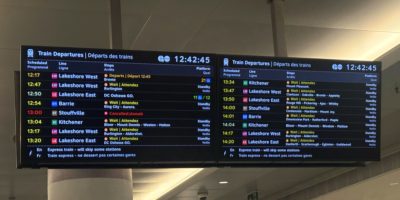By Aaliyah Dasoo
Brian Lesser has been the Chief Information Officer at Ryerson’s Computing and Communications Services (CCS) since 2015. When the pandemic first hit, Lesser and his CCS team were responsible for helping classes and offices transition online. While many people headed home from work and school in March, Lesser and the team at CCS had been updating their pandemic plan since January. The plan originated from the university’s experiences with the SARS outbreak in 2002 and had been updated after the H1N1 outbreak in 2009.
Lesser recently answered a few questions for The Eyeopener on how CCS has been operating to support students this semester.
Q: How has CCS helped students and faculty to transition to online programming? What sorts of measures were implemented to ensure a smooth and convenient transition?
Lesser: “I’m afraid this could be a long answer. I guess I’ll start with the planning we did to make sure our systems stayed online despite various possible scenarios.
In February we started looking at all our systems and their interdependencies. Our main concern was how to keep everything going if campus closed or our staff weren’t available to work. In some cases we increased the capacity of our systems, but in others the challenge of handling increased usage fell to the service providers like D2L, Zoom, and Google. Our staff practiced working from home to make sure we could really work remotely.
In April, the university set up [their] Keep Teaching Taskforce to help faculty and instructors move to alternative delivery methods for their courses. The taskforce includes the Centre for Excellence in Learning and Teaching, Chang School, library, CCS, and others. [We] worked long hours consulting with faculty and instructors, providing training sessions, online information and resources, answering questions, and helping them make use of [tools like] Zoom, D2L [and] G Suite.
Most of the direct support CCS offers students relates to things like resetting forgotten passwords or troubleshooting a technical problem. We didn’t see a significant increase in student requests [but] in early August we did get an increase in helpdesk calls from students who had problems with using two-factor authentication. Our helpdesk moved to working remotely and things seem to have gone reasonably well.”
Q: Has CCS done any work to ensure the accessibility of online programming come the fall semester?
Lesser: “Accessibility can mean many things: making sure our systems are working and available, that online services comply with or exceed what is required by the Accessibility for Ontarians with Disabilities Act (AODA), or it could mean helping students with inadequate internet access or who don’t have reliable access to a computer. In the latter case the library worked to help students by lending them laptops and helping with Internet access.
Some courses require access to computer labs or servers running specialised software on campus. To provide a relatively secure way for students in those courses to access those applications, we created a student VPN service and a remote login system. Students [can] sign in to the remote VPN and then to an available system. We’re working with interested academic departments so the student VPN works for their labs or servers as needed.”
Q: Has CCS received an influx of help requests since the university has moved online? Are they prepared for an influx should there be one during the fall semester?
Lesser: “We did receive an influx of questions and requests for assistance from faculty and instructors in March and an influx of helpdesk calls related to two-factor authentication in early August. We always prepare for a surge in support requests at the beginning of the fall term. We’ll see what happens, but there is so much preparation work being done now throughout the university for the fall that we don’t see obvious reasons to expect a spectacular increase in support requests. We think our employee and student help desks are ready and it looks like most students are setting up their accounts and making sure they can access our systems well in advance of the beginning of term.”
Q: What technologies and methods does CCS use to make sure Ryerson websites are fully functional and running? Students may need an extra level of reliability from home, since services like RAMSS or D2L can no longer be troubleshot with a professor in class or an advisor in office.
Lesser: “We already had in place extensive monitoring of our systems and processes for responding to problems—pandemic planning included putting in place extra capacity for our staff to be able to respond to problems remotely instead of in the office or datacentre. When absolutely necessary, staff do come onsite to install, repair or manage hardware. Google Meet’s screen sharing feature and the tools we use for remote access to computers have helped us troubleshoot problems [from home].
Other than coming to a classroom to fix equipment or to someone’s office, CCS immediate support has always been via phone, email, and video conference and includes remote management of devices and systems as people are trying to resolve problems. The big difference is that we aren’t fixing PC and connection issues in people’s offices and aren’t doing consulting and training in person. So when it comes to general support, much of what we are doing is similar to what we’ve done in the past.”












Leave a Reply